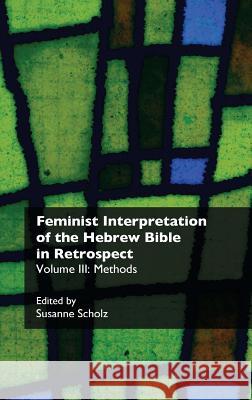Feminist Interpretation of the Hebrew Bible in Retrospect. III. Methods » książka
Feminist Interpretation of the Hebrew Bible in Retrospect. III. Methods
ISBN-13: 9781910928110 / Angielski / Twarda / 2016 / 408 str.
Feminist Interpretation of the Hebrew Bible in Retrospect. III. Methods
ISBN-13: 9781910928110 / Angielski / Twarda / 2016 / 408 str.
(netto: 387,30 VAT: 5%)
Najniższa cena z 30 dni: 406,67
ok. 16-18 dni roboczych
Bez gwarancji dostawy przed świętami
Darmowa dostawa!
This is the third of a set of three volumes reviewing the progress of feminist Hebrew Bible scholarship over the last forty years. In this third volume, eighteen contribu-tors focus on the wide range of exegetical methods as they have been productively employed in feminist bibli-cal interpretations. More specifically, each essay investigates how feminist Hebrew Bible exegetes have worked with exegetical methods. Each essay surveys the method under con-sid-eration as it has emerged in academic discourse gener-ally and in biblical studies in particular. Each es-say also explains how feminist uses of the various exe-getical methods have been deeply embedded within the theo-logical, cultural, and even political expecta-tions and as-sumptions of readers of the Bible. This volume asks readers to come to terms with the following question: What are the best methods for feminist exegesis in the light of past and present socio-political, theological, or hermeneutical developments in reading the Bible? After all, feminist theorists have come to recognize that methods are always already situated within powerful epistemological and method-ological structures that have their roots in vast arrays of histori-cal, political, economic, social, and religious factors. This volume encourages feminist debate on these complex issues that stand at the heart of biblical exege-sis."
This is the third of a set of three volumes reviewing the progress of feminist Hebrew Bible scholarship over the last forty years. In this third volume, eighteen contribu¬tors focus on the wide range of exegetical methods as they have been productively employed in feminist bibli¬cal interpretations. More specifically, each essay investigates how feminist Hebrew Bible exegetes have worked with exegetical methods. Each essay surveys the method under con¬sid¬eration as it has emerged in academic discourse gener-ally and in biblical studies in particular. Each es¬say also explains how feminist uses of the various exe¬getical methods have been deeply embedded within the theo¬logical, cultural, and even political expecta¬tions and as¬sumptions of readers of the Bible. This volume asks readers to come to terms with the following question: What are the best methods for feminist exegesis in the light of past and present socio-political, theological, or hermeneutical developments in reading the Bible? After all, feminist theorists have come to recognize that methods are always already situated within powerful epistemological and method¬ological structures that have their roots in vast arrays of histori¬cal, political, economic, social, and religious factors. This volume encourages feminist debate on these complex issues that stand at the heart of biblical exege¬sis.











